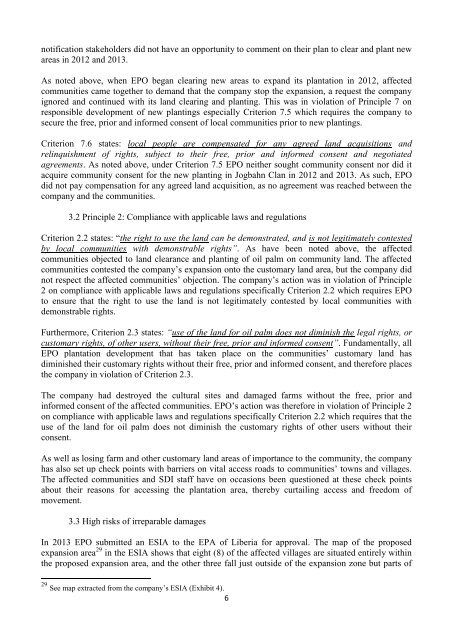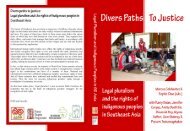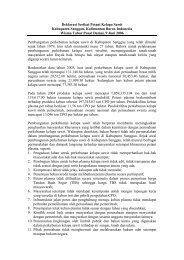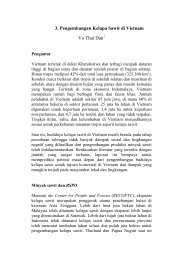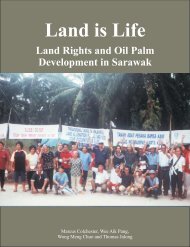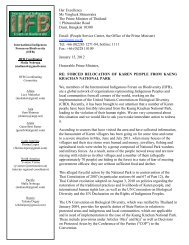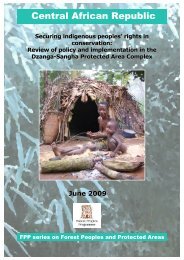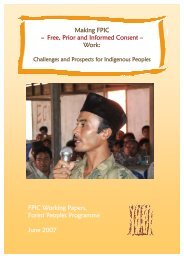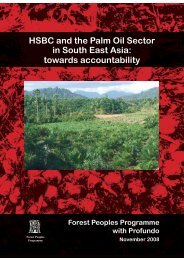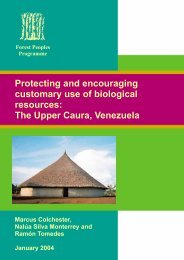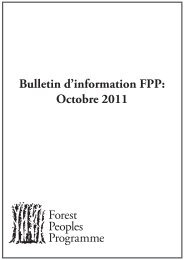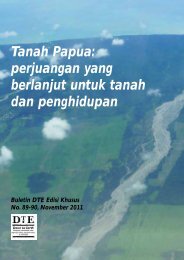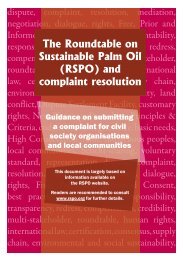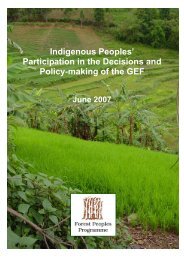Complaint - English (0.3 MB) - Forest Peoples Programme
Complaint - English (0.3 MB) - Forest Peoples Programme
Complaint - English (0.3 MB) - Forest Peoples Programme
Create successful ePaper yourself
Turn your PDF publications into a flip-book with our unique Google optimized e-Paper software.
notification stakeholders did not have an opportunity to comment on their plan to clear and plant newareas in 2012 and 2013.As noted above, when EPO began clearing new areas to expand its plantation in 2012, affectedcommunities came together to demand that the company stop the expansion, a request the companyignored and continued with its land clearing and planting. This was in violation of Principle 7 onresponsible development of new plantings especially Criterion 7.5 which requires the company tosecure the free, prior and informed consent of local communities prior to new plantings.Criterion 7.6 states: local people are compensated for any agreed land acquisitions andrelinquishment of rights, subject to their free, prior and informed consent and negotiatedagreements. As noted above, under Criterion 7.5 EPO neither sought community consent nor did itacquire community consent for the new planting in Jogbahn Clan in 2012 and 2013. As such, EPOdid not pay compensation for any agreed land acquisition, as no agreement was reached between thecompany and the communities.3.2 Principle 2: Compliance with applicable laws and regulationsCriterion 2.2 states: “the right to use the land can be demonstrated, and is not legitimately contestedby local communities with demonstrable rights”. As have been noted above, the affectedcommunities objected to land clearance and planting of oil palm on community land. The affectedcommunities contested the company’s expansion onto the customary land area, but the company didnot respect the affected communities’ objection. The company’s action was in violation of Principle2 on compliance with applicable laws and regulations specifically Criterion 2.2 which requires EPOto ensure that the right to use the land is not legitimately contested by local communities withdemonstrable rights.Furthermore, Criterion 2.3 states: “use of the land for oil palm does not diminish the legal rights, orcustomary rights, of other users, without their free, prior and informed consent”. Fundamentally, allEPO plantation development that has taken place on the communities’ customary land hasdiminished their customary rights without their free, prior and informed consent, and therefore placesthe company in violation of Criterion 2.3.The company had destroyed the cultural sites and damaged farms without the free, prior andinformed consent of the affected communities. EPO’s action was therefore in violation of Principle 2on compliance with applicable laws and regulations specifically Criterion 2.2 which requires that theuse of the land for oil palm does not diminish the customary rights of other users without theirconsent.As well as losing farm and other customary land areas of importance to the community, the companyhas also set up check points with barriers on vital access roads to communities’ towns and villages.The affected communities and SDI staff have on occasions been questioned at these check pointsabout their reasons for accessing the plantation area, thereby curtailing access and freedom ofmovement.3.3 High risks of irreparable damagesIn 2013 EPO submitted an ESIA to the EPA of Liberia for approval. The map of the proposedexpansion area 29 in the ESIA shows that eight (8) of the affected villages are situated entirely withinthe proposed expansion area, and the other three fall just outside of the expansion zone but parts of29 See map extracted from the company’s ESIA (Exhibit 4).6


